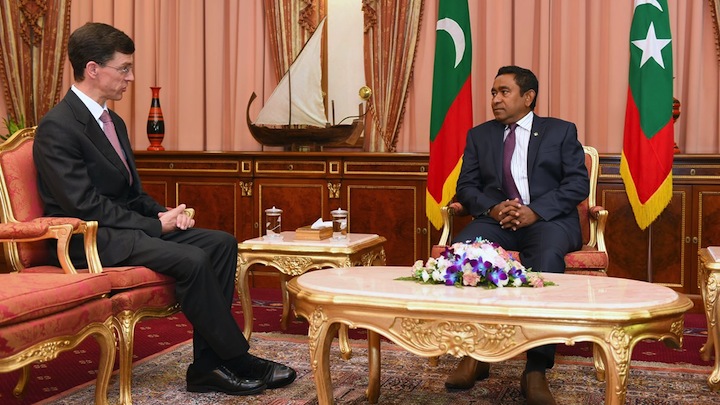All political parties including the ruling Progressive Party of the Maldives (PPM) must sit down together for the talks between the government and the opposition, the newly-appointed British High Commissioner to the Maldives James Dauris has suggested.
President Abdulla Yameen has called for separate talks with the three allied opposition parties – the main opposition Maldivian Democratic Party (MDP), the Jumhooree Party and the Adhaalath Party – to resolve the ongoing political crisis.
“We think it’s important that talks involving all parties should take place. It seems to me to be logical that talks should take place involving all the parties together, both the party in government and parties in opposition,” Dauris said in an interview with Minivan News during a two-day visit to the Maldives.
“Because what the government is talking about is a discussion between parties to talk about how inter-party relations will work. So it certainly strikes me as an observer that there is much to be said for getting all the parties to sit down together.”
In his first visit to the Maldives since his appointment as high commissioner, Dauris presented his credentials to President Yameen on Monday and met leaders of the three opposition parties.
Dauris said he shared the UK’s concerns over “the strength of democracy in the Maldives” with the president and spoke about the imprisonment of former President Mohamed Nasheed.
“President Nasheed is a special interest because he is a former president of your country. The number of countries in the world with former heads of state in prison is small,” he said.
Nasheed’s case is “emblematic,” he said, but the “wider concern” is over the judiciary.
A judiciary that is “visibly and credibly independent” is essential for democracy to flourish, he continued.
Nasheed’s conviction on terrorism charges in March after a 19-day trial drew widespread international criticism over apparent lack of due process and politicisation of the judiciary.
The government yesterday rejected Nasheed as the MDP’s representative for the talks as the opposition leader is serving a 13-year jail term.
The JP has meanwhile accepted the invitation for talks, but the religious conservative Adhaalath Party proposed its detained president, Sheikh Imran Abdulla, among the party’s representatives.
Imran was arrested in the wake of a mass anti-government demonstration on May 1 and remains in police custody.
The May Day demonstration was the second mass protest staged by the opposition calling for the release of former President Nasheed and ex-defence minister Mohamed Nazim.
However, the government has ruled out negotiations for the release of the pair – whose arrest in February triggered the political crisis – insisting the president does not have the constitutional authority to release convicts before the appeal process is exhausted.
The opposition ‘Maldivians against tyranny’ alliance has called for a third mass protest on June 12.
“Shared interests”
Dauris said the Maldives and the UK has “shared interests” in the areas of climate change, Islamic radicalism, and drug abuse.
The Alliance of Small Island States (AOSIS), which the Maldives currently chairs, should be “ambitious in helping use its influence” at the upcoming climate summit in Paris, he said.
Small island states could play a role to ensure that the international community reaches a “good and ambitious international commitment to work to reduce carbon emissions.”
“Islamic extremism is another shared concern we have. Like the Maldives, we have people in Britain going off to join IS in Syria, often going through Turkey,” he continued.
“We worry for them, for the grief it causes their families, and we worry for the damage it does in their communities, and the potential threat these people could represent when they return home.”
He observed that the Maldives has “a relatively high number” of jihadis in Syria and Iraq. In January, the police said more than 50 Maldivians are in Syria, but the opposition says the figure could be as high as 200.
Dauris was previously the British high commissioner to Peru.
Likes (1)Dislikes
(1)Dislikes (0)
(0) 
